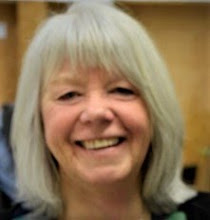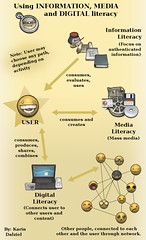 The direction the workshop went today was intriguing. In a round table exchange of what people had been doing, the conversation for me, twisted and turned between censorship of information, how to extract the juicy bits you need quickly and easily, how to manage information so it comes to you (RSS Feeds) and podcasting. So what is a pod...cast? Not a bunch of dolphins surely!
The direction the workshop went today was intriguing. In a round table exchange of what people had been doing, the conversation for me, twisted and turned between censorship of information, how to extract the juicy bits you need quickly and easily, how to manage information so it comes to you (RSS Feeds) and podcasting. So what is a pod...cast? Not a bunch of dolphins surely!After bouncing some ideas off each other, we came to the consensus that podcasting was about bundles (pods) of information that is stored so people can subscribe to it, eg. download it to something like an ipod or other media player. In this way it becomes information which is broad casted. If you think about it dolphins broadcast sounds to each other and they run in pods. My silliness led me to an interesting music video "Dolphins Galaxia" created by Adrian Loo and Ivan Chew on Garage Band incorporating dolphin calls. What is interesting about it really is the process the authors went through to create it, the searching for sources of video and music tracks with creative Commons licensing, and the editing to create a new entity. Well all that is another story which you can read about on ther website...
Back to the workshop....We found out during our talk that the University of Otago has joined forces with itunes to enter the podcasting arena; this gives them a lot of kudos to be named alongside Harvard, Yale and others who are also in cahoots with itunes. We had some discussion about whether recording lectures, which the university was doing last year, and putting them on Blackboard is podcasting. No it is not, so we were dubious about the claims. When we went looking we found they are indeed doing some bona fide podcasting, and starting small with podcasts of events including concerts and professorial lectures with plans to move into providing resources for learning.
My search for definitions of podcasting threw up quite a lot of variation. The pod in podcasting appears to have derived from Apple's ipod. Casting relates to broadcasting. Try out some of these definitions for size and see which one you prefer:
1. "A form of audio broadcasting using the Internet, podcasting takes its name from a combination of “iPod” and broadcasting. iPod is the immensely popular digital audio player by Apple computer, but podcasting does not actually require the use of an iPod." From:
http://www.duranos.com/index.php/resources/web-glossary/
2. "Podcasting is the method of distributing multimedia files, such as audio or video programs, over the Internet using syndication feeds, for playback on mobile devices and personal computers."
http://www.oit.duke.edu/dms/glossary.html
3. "Posting or transmitting an audio file to be downloaded and viewed/heard by other internet users either on a computer or MP3 player."
http://www.folly.co.uk/
My favourite is number 2, as it is more precise and dispels the misconception that podcasting is only about audio files.
RSS feeds
It was fun to watch RSS in plain english again. Each time I learn something new, today the tip about clicking the subscribe icon in the url address bar was reinforced for me. I also picked up some excellent tips from Sunshine who showed us her Bloglines set up - interesting art websites and how to use the clip feature to save interesting posts to refer to at a later date - and Sarah who demonstrated iGoogle and her Google Reader. I have an iGoogle page but need to set it to my homepage to utilise it properly.
My goal now is to get better at using my iGoogle page and Bloglines. That way I will be able to set up a feed for alerts about stuff I am interested in. For example, after a discussion today about censorship of information in countries like China and Burma, I realised that many of our educational organisations in New Zealand are doing the same thing to students as military dictatorships are doing to their citizens - preventing access to information.
An example of how barriers can be overcome is illustrated by what happened when the poor response by the rulers in Burma after the cyclone was counteracted by a rapid global response to a plea by the AVAAZ organisation; they facilitated aid to Burmese monks - the monks used Youtube and the help of AVAAZ to get support. AVAAZ means voice in many Asian, Middle Eastern and Eastern European languages - and "is a new global web movement with a simple democratic mission: to close the gap between the world we have, and the world most people everywhere want." In a matter of days almost $1 million $ was raised for the effort, the count is now up to $2 mill. The New Internationalist website and blog has some more information about the situation there.
Will also illustrated how membership of a group on the same path can be very helpful when he asked the group to test his survey about digital competencies. This leads me on another path which I will post about next...how to gather information for projects.

